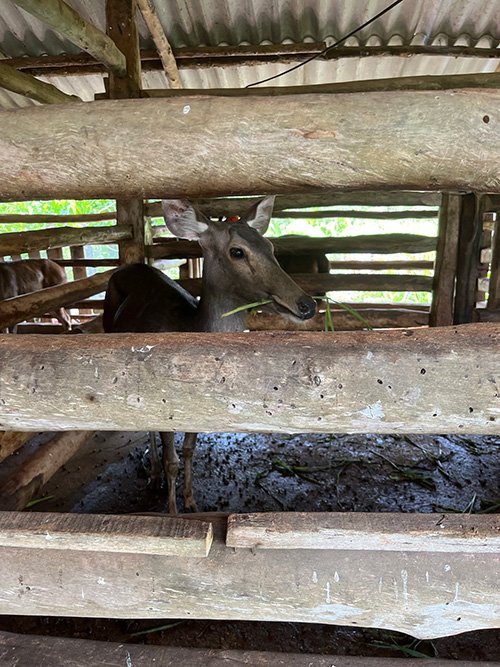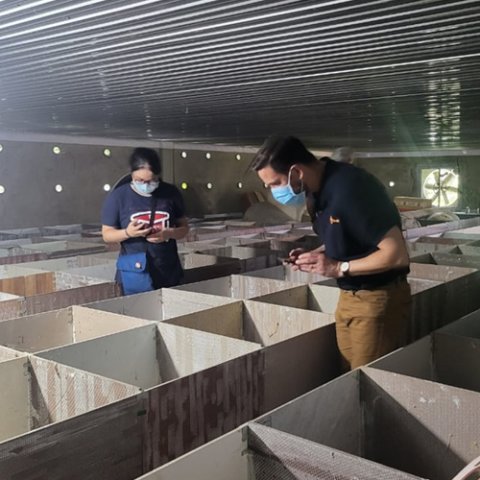By Priscilla Lalisse-Jespersen
STOP Spillover Interim Project Co-Director Dr. Jonathon Gass recently traveled to Viet Nam to conduct site visits to wildlife farms with the country’s team on the ground. Dr. Gass, Assistant Professor at Tufts University School of Medicine, is an infectious disease epidemiologist specializing in transmission dynamics of zoonotic viruses between animals and humans.
I talked to Dr. Gass about his experience and here’s what he told me.
Priscilla: Why did you decide to go to Viet Nam?
Dr. Gass: As the newly appointed interim co-PI of STOP Spillover, I visited several sites with our country team in Viet Nam to see the impact of our activities. Our work is primarily with legal wildlife farms - we collaborate with farmers, government staff, and other stakeholders to design interventions that reduce the risks of viral spillover from wild animals to people.
Priscilla: What were you hoping to find and or experience during your visit?
Dr. Gass: My goal was to look at and assess activities that our country team is implementing in collaboration with governmental agencies to address major challenges in One Health. Wildlife farming is an incompletely regulated industry with implications for veterinary, environmental, and human health. Collaboration between One Health government agencies is critical for developing interventions and policies to protect animal, environmental and human health.
Priscilla: Ha Nguyen, Viet Nam's country lead, has said that the biggest challenge to preventing spillover in the country is gaps in understanding the spillover ecosystem at the provincial and local levels and how to design interventions that prevent and mitigate spillover. Did you see examples of that while in the country?
Dr. Gass: STOP Spillover is working to address these gaps through community mobilization, training, cross-sectoral collaboration, and the development of evidence-based interventions, including those focused on increasing biosafety and safe farming practices, providing preventative veterinary health resources for farmers, and proper management of animal waste.
Priscilla: Do you believe that things are improving?
Dr. Gass: Through the efforts of STOP Spillover, I witnessed considerable collaboration and participation by representatives across sectors, from human health to forestry to animal health. Cross-sectoral meetings regularly take place to address human and animal health and biosafety on wildlife farms. So yes, STOP Spillover is filling major gaps, which will improve conditions at wildlife farms for the animals and the humans who operate them.
Priscilla: Ha Nguyen also said that local communities in Viet Nam generally have not yet changed their attitudes or behavior as much as will be needed to prevent viral spillover at key interfaces, including wildlife farms.
What did you see/witness or experience while conducting site visits to wildlife farms in Viet Nam?
Dr. Gass: I visited several wildlife farms, in particular those farming wild porcupines, sambar deer, bamboo rats, and civet cats. These farms are family-owned and operated where wild animals are bred and reared in captivity. The animals are sold for wild meat consumption by humans, sold to other farms for breeding purposes, or sold as pets. Given the risks involved with wildlife farming and the potential for amplification of zoonotic viruses, STOP Spillover uses a harm reduction approach to ensure that farming practices are done safely to protect human and animal health. In the past, there have been several outbreaks at wildlife farms in Viet Nam, including canine distemper virus (CDV), which kills the animals and threatens the livelihoods of farmers (and their pets). Though STOP Spillover does not focus on CDV and focuses instead on several high-consequence viral pathogens including coronaviruses, our biosafety interventions have been designed to stop the transmission of multiple pathogens from farmed wildlife to humans. I witnessed farmers donning personal protective equipment (PPE) before entering animal enclosures, using microbicide to decontaminate footwear before entering and exiting animal enclosures, and farmers conducting meetings to share knowledge of signs of animal disease and safe husbandry practices.
Priscilla: What did you see in terms of collaboration on the ground?
Dr. Gass: Our country team brings together multiple ministries across Viet Nam to work together to address pandemic threats, particularly at wildlife farms. Wildlife farming is unregulated and will not stop if made illegal. All actors agree that a harm reduction approach is timely and what is needed to protect human populations from viruses and other pathogens that these farmed wildlife species may carry.

Priscilla: What surprised you during your trip?
Dr. Gass: STOP Spillover is well established to intervene at the wildlife-human interface in Viet Nam due to the expertise of our country team and Consortium members that we have assembled to tackle this challenge. What surprised me was the widespread, accepted, and unregulated practice of wildlife capture and farming and the tremendous opportunity STOP Spillover has to make meaningful improvements to protect the health of humans and animals at these interfaces. There is a lot of interest among wildlife farmers, government officials, and other stakeholders to work together to find ways to increase effective biosafety practices at wildlife farms. Farming practices are critical for the financial livelihoods of farmers and their families. When outbreaks occur on farms and the animals either die or need to be culled, this has serious financial repercussions. STOP Spillover’s interventions will not only protect health but also provide increased financial stability via risk reduction.
Priscilla: What would you consider a "win" when it comes to Viet Nam and STOP Spillover?
Dr. Gass: STOP Spillover has implemented effective interventions and advanced the conversation at community and government levels about reducing the risks of zoonotic viral spillover on wildlife farms. I am confident that STOP Spillover will continue to work across government sectors and with community members to put measures in place to increase biosafety, improve knowledge and practices, and enact policies that will protect human populations from risks associated with wildlife farming. This is just one piece of our global objective to reduce risks associated with prioritized zoonotic viruses at interfaces where spillover events could pose the next pandemic threat.
